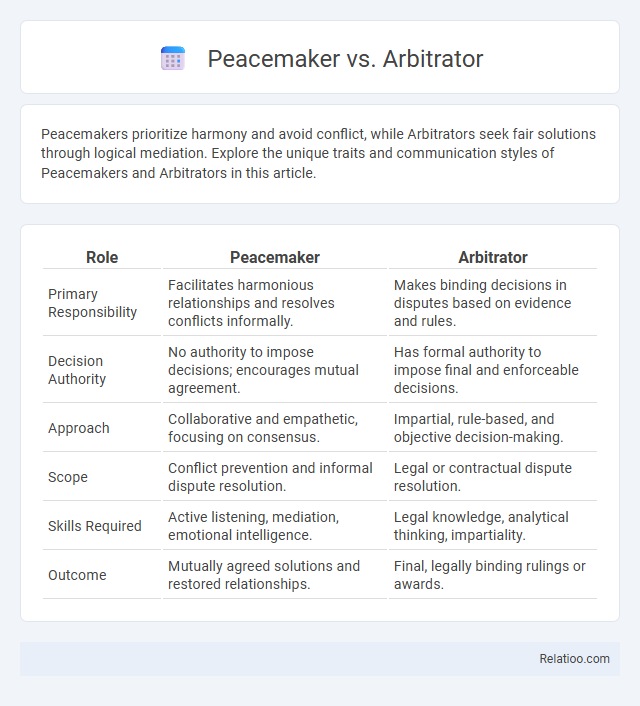Peacemakers prioritize harmony and avoid conflict, while Arbitrators seek fair solutions through logical mediation. Explore the unique traits and communication styles of Peacemakers and Arbitrators in this article.
Table of Comparison
| Role | Peacemaker | Arbitrator |
|---|---|---|
| Primary Responsibility | Facilitates harmonious relationships and resolves conflicts informally. | Makes binding decisions in disputes based on evidence and rules. |
| Decision Authority | No authority to impose decisions; encourages mutual agreement. | Has formal authority to impose final and enforceable decisions. |
| Approach | Collaborative and empathetic, focusing on consensus. | Impartial, rule-based, and objective decision-making. |
| Scope | Conflict prevention and informal dispute resolution. | Legal or contractual dispute resolution. |
| Skills Required | Active listening, mediation, emotional intelligence. | Legal knowledge, analytical thinking, impartiality. |
| Outcome | Mutually agreed solutions and restored relationships. | Final, legally binding rulings or awards. |
Introduction to Peacemaker and Arbitrator Roles
Peacemaker and Arbitrator roles both focus on conflict resolution but differ in approach and authority. Peacemakers facilitate open communication and mutual understanding to help parties reach voluntary agreements, emphasizing empathy and collaboration. Arbitrators hold decision-making power to impose binding judgments based on presented evidence, often used when parties cannot agree independently.
Defining Peacemaker: Key Characteristics
Peacemaker type in the Enneagram is characterized by a desire for harmony, avoidance of conflict, and a calming presence that helps soothe tensions in any environment. Your gentle, accepting nature often leads you to prioritize others' needs, seeking to maintain peace through empathy and understanding. Key traits include patience, adaptability, and a tendency to suppress personal desires to prevent discord.
Defining Arbitrator: Essential Qualities
An arbitrator embodies impartiality, expertise in dispute resolution, and strong decision-making skills vital for fair conflict adjudication. Unlike a peacemaker who encourages dialogue or a mediator who facilitates negotiation, an arbitrator holds authoritative power to issue binding rulings. Essential qualities include neutrality, legal knowledge, and the ability to analyze complex information objectively to ensure just outcomes.
Core Differences: Peacemaker vs Arbitrator
Peacemaker personalities prioritize harmony, seeking to avoid conflict by promoting understanding and compromise, while Arbitrators focus on fairness and justice, analyzing situations deeply to find balanced and ethical resolutions. Your approach as a Peacemaker is centered on maintaining peace and emotional connection, whereas an Arbitrator relies on critical thinking and objective evaluation to settle disputes. These core differences highlight that Peacemakers smooth relations through empathy, while Arbitrators emphasize impartiality and principled judgment.
Approaches to Conflict Resolution
Peacemaker prioritizes harmony and empathy, seeking to resolve conflicts through understanding and compromise, while Arbitrator employs a neutral, authoritative stance to impose fair decisions based on facts and rules. Peacemaker's approach fosters collaboration and emotional connection, whereas Arbitrator emphasizes objectivity and structured resolution procedures. Your choice between these methods depends on whether you value relational balance or formal adjudication in conflict resolution.
Legal Framework: Authority and Boundaries
Peacemakers operate under informal legal frameworks, focusing on mediation without formal authority to impose binding decisions, while arbitrators act within established legal parameters granting them authority to render binding awards based on contract or statutory provisions. Peacemakers emphasize consensual resolution and collaborative problem-solving, whereas arbitrators function as quasi-judicial decision-makers whose awards are enforceable by courts. The boundary between these roles lies in enforcement power: arbitrators have legally sanctioned authority to decide disputes definitively, contrasted with peacemakers who facilitate agreement without imposing outcomes.
Peacemaker vs Arbitrator in Workplace Disputes
Peacemaker and Arbitrator play distinct roles in workplace disputes, with Peacemakers focusing on fostering dialogue and mutual understanding while Arbitrators deliver binding decisions to resolve conflicts. You benefit from Peacemakers when seeking collaborative, non-confrontational conflict resolution that prioritizes relationships and long-term harmony. Arbitrators, by contrast, provide a structured, authoritative solution when impartial judgment and definitive outcomes are necessary to settle disagreements efficiently.
Effectiveness in International Conflicts
Peacemakers focus on dialogue facilitation and empathy building, making them effective in de-escalating tensions and fostering mutual understanding in international conflicts. Arbitrators bring legal expertise and authoritative decision-making power, providing clear resolutions but sometimes risking resentment from parties feeling unheard. Your choice depends on whether you prioritize collaborative harmony (Peacemaker) or binding, enforceable decisions (Arbitrator) for sustained conflict resolution.
Strengths and Limitations of Each Role
Peacemakers excel at creating harmony and mediating conflicts by fostering understanding and compromise, though they may struggle with decisive action and confrontation. Arbitrators bring impartial judgment and enforceable decisions to disputes, providing clear resolutions but sometimes facing resistance due to perceived authority or lack of empathy. Peacemakers emphasize empathy and relationship-building, Arbitrators focus on fairness and rules, while Peacemakers balance these traits with a commitment to maintaining peace, yet all roles can face challenges in balancing assertiveness with tolerance.
Choosing the Right Path: When to Use a Peacemaker or Arbitrator
Choosing the right dispute resolution method depends on the complexity and desired outcome of the conflict. A Peacemaker focuses on facilitating communication and mutual understanding to achieve a harmonious agreement, ideal for preserving relationships and resolving personal or workplace disputes. An Arbitrator delivers a binding decision based on evidence and legal principles, suitable for situations requiring enforceable resolutions or when parties seek a definitive end to a disagreement.

Infographic: Peacemaker vs Arbitrator
 relatioo.com
relatioo.com